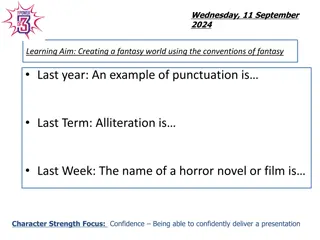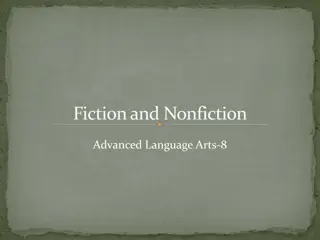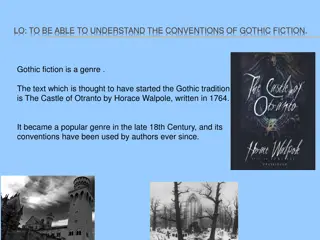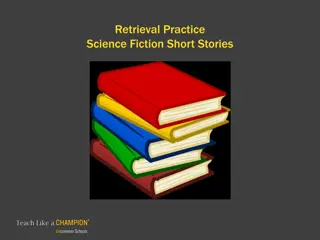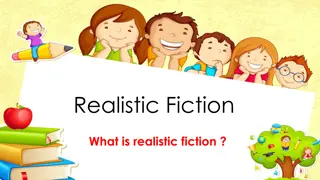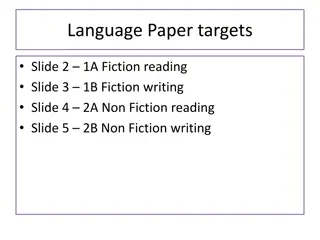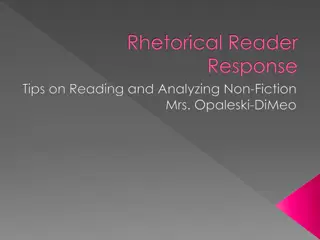The Rise of Absurdist Fiction
Absurdist fiction emerged in the 1950s and 1960s, post-WWII, challenging existential concepts through characters in purposeless situations. Influenced by Kierkegaard and Camus, it questions the irrationality of life, with notable writers like Beckett and Camus shaping the genre.
Download Presentation

Please find below an Image/Link to download the presentation.
The content on the website is provided AS IS for your information and personal use only. It may not be sold, licensed, or shared on other websites without obtaining consent from the author.If you encounter any issues during the download, it is possible that the publisher has removed the file from their server.
You are allowed to download the files provided on this website for personal or commercial use, subject to the condition that they are used lawfully. All files are the property of their respective owners.
The content on the website is provided AS IS for your information and personal use only. It may not be sold, licensed, or shared on other websites without obtaining consent from the author.
E N D
Presentation Transcript
Arabic Drama Arabic 2702 Dr. Zuheir Alidib
Traditional Dramatic Entertainment Classical Arabic Lit: Did not exist. Medeaval Arabic Lit: Al Hamadhani - Maqama (10thC) - western influence 1. Khayal al Zill (shadow play). 2.Zajal (Colloquial Verse) Songs dealing with historical themes Musical theater
Marun al- Naqqash: (Lebanon)1847 imported the European model of theater (The Miser) Salim al- Naqqash: (Lebanon-Egypt) 1876- Aida (Verdi s Opera) & Abu Hassan al-Mughaffal (fool). Abu Khalil al-Qabbani: (Syria Egypt) plays w/ love theme, moral significance (Racine, Hugo and other plays from traditional Arabic source.
Tawfiq al-Hakim (1898 1987) Father of modern Arab drama. 1. Sajin al-umr (Autobiography) Interests in theater (father). 2. Unwelcomed guest (allegory)
In France: He was interested in Avant Gard theater/ Pirandello. He was inspired by the stage direction of Ibsen, Maeterlinck & Shaw, and Pitoeff Theater of Ideas.
Theater of the Mind: Bullet in the Heart & Sleepers of the Cave -1933. Arabic Drama became a respectable form of lit. Theater of society: 1945 1950 Political & social themes The Sultan Dilemma Theater of the Absurd: 1962 The Tree Climber
The Wisdom of Solomon Derived from the Old Testament, The Quran and the Arabian Nights. Significance: 1. The importance of power in capturing the heart. 2. The corrupting influence of absolute power.
1. The importance of power in capturing the heart. Illustrated by the failure of: - Solomon to win the love of the queen. - The queen to gain the love of her captive prince, Mundhir, who lost his heart to the queen s maid
2. The corrupting influence of absolute power. - Infliction of Suffering on the queen. - Attempt to force the queen to give up her love. - Feeling ashamed.
The play is based on the mythological elements (Quran, Old Testament, Arabian Nights). It suffers from a loose structure.
Shahrazad Short play of 7 scenes Poetic Somber Humors (minimum) Surreal Reality/Fantasy Sanity/Insanity Wisdom/Folly
Striking Features: - Short speeches - Poetic utterances - Mystical associations These futures compensate for the relative rarity of external actions.
The playwright resorts to a cunning use of: Sound effects Music Singing Light and darkness The natural setting add mysterious nature to the play and to main character.
The play is a dramatic prose poem in dialogue. It is a part of the theater of the mind. Message: Can a man live only with and for his mind?
King Oedipus Return to the classical world of ancient Greece. The aim is to forward a thesis, to present a Greek tragedy viewed through a Muslim eyes.
Hakim said: My religious faith as a Muslim rejects the idea of a God who schemes before hand to harm utterly innocent man . He claims that the idea of predestination was not accepted by the major Islamic philosophers. He takes a middle position on the idea of Fate.
He introduced many changes in the story of Oedipus 1. Final analysis of the King (unsatisfactory play) 2. No prophecy (Kill, Marry) 3. Oedipus does not run away to avert his doom 4. He goes on a journey to find the truth about his parentage. 5. No Sphinx
Teieresias: 1. Suggests to Laius to get red of his son 2. Invents the episode of the sphinx Oedipus king 3. Hates Creon No King Oedipus allows himself to be used. Tragic outcome of the play not the envy of gods but the nature of Oedipus character passion for investigation obsession for the truth. Drastic Changes No Fate.
The Tree Climber Experimental Drama Flashbacks First p. 6 Second P. 22 End of the play Empty stage - Sounds
Interpretation: 1. Conflict between art and demands of life (Pygmalion) Husband: Artist Perfect work (Tree). Wife: Preoccupied with the child that was not born.
Ironic Statement: - Happy life = No conventional communication. - Intellectual communication in intimate human relations is impossible to achieve Message: Each man is an island, any attempt to break into his world spells disaster.
Techniques of the theatre of the absurd: 1. Communication breakdown 2. Traditional Theatrical conventions not followed 3. No sets or fixed props 4. No division between time and place, past and present 5. Characters + scenery (not realistic). 6. Lots of questions are left unanswered - Dervish - connection between the wife and Lady Green - wife s body







